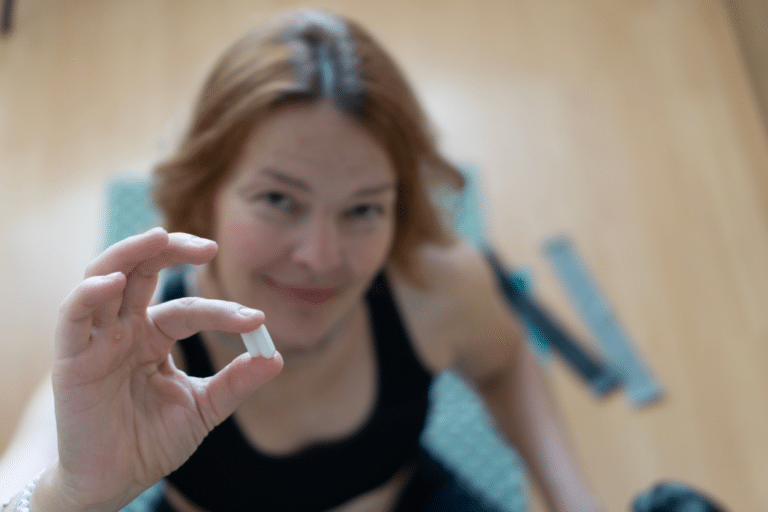Collagen in Perimenopause?
Sarah has had a long winter. She always felt that she looked young for her age but recently-not so much. Glancing at herself in the mirror, she can’t help but notice how winter dryness and stress have deepened her fine lines. Sarah’s friend at yoga told her recently of a “miracle supplement” she’s been using called, collagen. She wonders what it is and whether it’s really ALL THAT.
What is Collagen?
So, what exactly is it? Collagen is the main structural protein in the human body. It is found in the skin, tendons, ligaments, and other connective tissues. Collagen can be thought of as the body’s scaffolding or the glue that holds the body together.
Collagen makes about 75% of the dry weight of your skin. 28 types of collagen have been identified with types I, II, and III being the most common. Types I and III are mostly found in your skin and bones, while type II is found in your joints.
Collagen provides volume which keeps skin looking plump, dewy, and fresh. As we age, we start to break down collagen faster than we can replace it. As we approach our forties, we lose about a teaspoon of collagen a year. Falling estrogen levels, as well as age, contribute to this.
In addition, collagen is essential for a healthy gut. The amino acids in collagen provide soothing and reparative properties for the digestive tract. Glycine, one of the amino acids found in abundance in collagen protein. It has been shown to stimulate stomach acid production thereby improving digestion and nutrient absorption.
Is There Any Way to Replace Collagen?
Yes. Chinese women have been supplementing their diets for years with collagen. Collagen is viewed as a “fountain of youth.” Women routinely consume foods like pig’s feet, shark fins, and donkey skin. Doesn’t sound appetizing to you?
Never fear…recently collagen supplements have become a hot commodity in the nutraceutical world.
Forms of Collagen Supplements
The best way to supplement collagen is through an oral route. Injecting collagen into the skin can cause allergic reactions. Tt doesn’t last as long as other injectable skin fillers. Also, when applied topically it doesn’t absorb well into the skin.
Most collagen supplements are sourced from animals such as pigs, cows, and fish.
They can be found in three main forms:
- Hydrolyzed collagen-also known as collagen hydrolysate or collagen peptides, this form is separated into smaller proteins called amino acids.
- Gelatin– the collagen in gelatin is partially broken down into amino acids.
- Raw– or denatured forms, the collagen protein remains intact.
Of these forms, some research shows that your body may absorb hydrolyzed collagen best. Also, this type of collagen has a higher water solubility. This means it can be dissolved in drinks and food more easily.
Collagen is most commonly found in powder form, which can be added to your favorite beverage. It is also available in gummies, capsules, liquid forms, protein powders, and meal replacement bars. Bone broth contains collagen in addition to several other nutrients.
Do Collagen Supplements Really Work?
We know the market is saturated with a plethora of collagen products…but do they really work? Here is the evidence thus far.
One 2014 study of 69 women ages 35-55 found that those who took either 2.5 or 5 grams of collagen daily for 8 weeks showed an improvement in skin elasticity, compared to those who didn’t take it.
Another study showed that women who took 1 gram per day of a chicken-derived collagen supplement for 12 weeks had 76% less dryness, 12% fewer visible wrinkles, better blood flow in the skin, and a 6% higher collagen content.
And a 2019 review of eight studies (which included 805 patients) showed that “preliminary results are promising for the short and long-term use of oral collagen supplements for wound healing and skin aging.”
Are They Safe?
Collagen supplements are generally safe for most people. Some folks report mild side effects such as nausea, upset stomach, and diarrhea.
People who suffer from histamine intolerance might have a negative reaction when consuming collagen protein. It is uncommon to hear about side effects from collagen protein, but quite a few patients that start consuming collagen peptides self-reported increased histamine reactions.
Women that are sensitive to glutamine need to be cautious when consuming collagen protein. Glutamine is an amino acid that is found in abundance in collagen. While glutamine is beneficial for some, others may be sensitive to it. Some people have gene SNPs that prevent them from breaking down glutamic acid.
High levels of glutamic acid may trigger agitation, brain fog, migraines, insomnia, mood swings, more serious mood disorders, and even seizures if you are prone to them. Magnesium and Vitamin B6 can support the breakdown of glutamic acid.
If you want to try supplementing collagen, choose supplements from companies that get their bones and tissues from cage-free, free-range, and antibiotic-free sources to ensure you are receiving the safest product available. Look for a trusted brand with a third-party label like NSF (National Sanitation Foundation) or USP (United States Pharmacopeia). Or, you can make your own bone broth.
The Bottom Line
The scientific evidence for using collagen supplements to reduce wrinkles and support gut health is hopeful, but higher-quality studies are needed. In the meantime, it won’t do you harm to make yourself a nice warm cup of bone broth and relax with a good book. If anything, it will naturally reduce your levels of stress which leads to fewer wrinkles. Enjoy!
Dr. Anna Garrett is a menopause expert and Doctor of Pharmacy. She helps women who are struggling with symptoms of perimenopause and menopause find natural hormone balancing solutions so they can rock their mojo through midlife and beyond. Dr. Anna is the author of Perimenopause: The Savvy Sister’s Guide to Hormone Harmony. Order your copy at www.perimenopausebook.com.
Dr. Anna is available for 1-1 consultation. Find out more at www.drannagarrett.com/lets-




